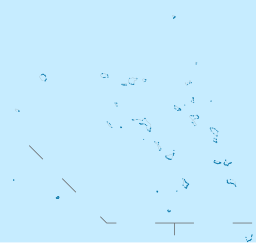Lomilik is a seamount in the Western Pacific Ocean, within the exclusive economic zone of the Marshall Islands.[1] It lies to the west of Enewetak atoll[2] and is named after the best fishing site in Anewetak atoll.[3]
| Lomilik | |
|---|---|
 Bathymetry of Lomilik and Ļami Seamounts | |
| Summit depth | 1,350 metres (4,430 ft) |
| Location | |
| Coordinates | 11°42′N 161°37′E / 11.700°N 161.617°E |
| Country | Marshall Islands |
Lomilik has a 40-by-15-kilometre-wide (24.9 mi × 9.3 mi) summit terrace with the proper summit at circa 1,500 metres (4,900 ft) depth; a scarp separates the two and small hills reach depths of 1,350 metres (4,430 ft). The summit terrace is covered by rocks with ooze in between. A notch in the southern flank of Lomilik was likely created by a landslide.[2][4] It is part of the Magellan Seamounts[5] and consists of a Cretaceous volcano with a thin layer of carbonate rocks and ferromanganese.[6] Lami seamount lies northwest of Lomilik.[7]
The rocks found on Lomilik consist of basalt and limestone.[8] Fluorapatite, hyaloclastite,[9] mudstone, phosphorite and siltstone have been identified in rocks from the seamount.[10] Manganese nodules have been found on Lomilik[1] and the manganese crusts on the seamount reach thicknesses of over 10 centimetres (3.9 in);[11] the thickest crust recovered from an ocean is a 18 centimetres (7.1 in) thick ferromanganese crust from Lomilik recovered in 1989.[2] The deposits on Lomilik could potentially be mined.[12]
References
edit- ^ a b Hein, J.R.; Koschinsky, A. (2014-01-01). "Deep-Ocean Ferromanganese Crusts and Nodules". Treatise on Geochemistry. p. 274. doi:10.1016/B978-0-08-095975-7.01111-6. ISBN 9780080983004.
- ^ a b c Hein et al. 1998, p. 2.
- ^ Hein et al. 1990, p. 245.
- ^ Hein et al. 1999, p. 3.
- ^ Hyeong, Kiseong; Kim, Jonguk; Yoo, Chan Min; Moon, Jai-Woon; Seo, Inah (December 2013). "Cenozoic history of phosphogenesis recorded in the ferromanganese crusts of central and western Pacific seamounts: Implications for deepwater circulation and phosphorus budgets". Palaeogeography, Palaeoclimatology, Palaeoecology. 392: 294. Bibcode:2013PPP...392..293H. doi:10.1016/j.palaeo.2013.09.012. ISSN 0031-0182.
- ^ Kim, Jonguk; Hyeong, Kiseong; Jung, Hoi-Soo; Moon, Jai-Woon; Kim, Ki-Hyune; Lee, Insung (1 December 2006). "Southward shift of the Intertropical Convergence Zone in the western Pacific during the late Tertiary: Evidence from ferromanganese crusts on seamounts west of the Marshall Islands". Paleoceanography. 21 (4): 2. Bibcode:2006PalOc..21.4218K. doi:10.1029/2006PA001291. ISSN 1944-9186.
- ^ Hein et al. 1990, p. 108.
- ^ Hein et al. 1998, p. 4.
- ^ Hein, James R.; Koschinsky, Andrea; Halbach, Peter; Manheim, Frank T.; Bau, Michael; Kang, Jung-Keuk; Lubick, Naomi (1997). "Iron and manganese oxide mineralization in the Pacific". Geological Society, London, Special Publications. 119 (1): 127. Bibcode:1997GSLSP.119..123H. doi:10.1144/GSL.SP.1997.119.01.09. ISSN 0305-8719. S2CID 128892570.
- ^ Hein, James R.; Benninger, Laura M. (2000). Diagenetic Evolution of Seamount Phosphorites (Report). p. 248.
- ^ Hein et al. 1990, p. 32.
- ^ Hein et al. 1999, p. 14.
Sources
edit- Hein, J.R.; Kang, Jung-Keuk; Schulz, M.S.; Park, Byong-Kwon; Kirschenbaum, Herbert; Yoon, Suk-Hoon; Olson, R.L.; Smith, V.K.; Park, Dong-Won (1990). Geological, geochemical, geophysical, and oceanographic data and interpretations of seamounts and co-rich ferromanganese crusts from the Marshall Islands, KORDI-USGS R.V. FARNELLA cruise F10-89-CP (Report).
- Hein, James R.; Moon, Jai-Woon; Lee, Kyeong-Yong; Kim, Ki-Hyun; Roberts, Leanne; Burrows, Malia; Park, S.H.; Dowling, Jennifer; Choi, Youn-ji (1998). Composition of Co-rich ferromanganese crusts and substrate rocks from the Marshall Islands, cruise KODOS 97-4 (Report).
- Hein, J.R.; Moon, Jai-Woon; Lee, Kyeong-Yong; Dowling, J.S.; Kim, Ki-Hyune; Burrows, Malia; Park, S.H.; Choi, Youn-ji; Schuetze, A.A. (1999). Co-rich Fe-Mn crusts from the Marshall Islands (Leg 1) and hydrothermal and hydrogenetic Fe-Mn deposits from Micronesia (Leg 2), KODOS 98-3 cruise, West Pacific (Report).
